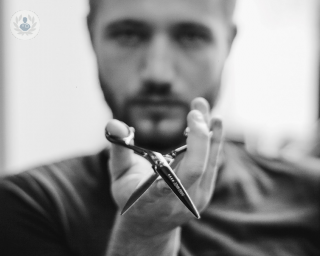What are penis disorders?
Penis disorders are conditions and diseases affecting the male genital organ. These can negatively affect one’s sexual function and fertility. Penile problems can be both conditions and infections, such as balanitis, phimosis, Peyronie’s disease, candidiasis (thrush), ejaculatory problems or sexually transmitted infections (STIs).

What are the symptoms?
The symptoms largely depend on the type of the condition or disease affecting the penis. The most common symptoms are usually pain, inflammation, itching, erectile dysfunction or trouble passing urine.
How are they diagnosed?
Regardless of the specific problem, you will need to see a specialist for an accurate diagnosis. In the vast majority of cases, an urologist will examine you and may then prescribe further, more specific tests to determine what disease or condition is affecting you and how severe it is.
What causes them?
Penis disorders can be caused by several factors, such as genetic factors, infection, inflammation or environmental factors such as smoking, eating an unhealthy diet and poor hygiene.
How can they be prevented?
Some penis problems can be prevented, such as those caused by an infection or STIs. On the other hand, those caused by genetic factors cannot be prevented, however, early detection may be helpful.
How can they be treated?
Penis problems can be treated either with medication or with surgery.
Which doctor should I talk to?
You should see an urologist for penis disorders.
05-18-2017 01-12-2024Penis disorders
Mr Marcus Cumberbatch - Urology
Created on: 05-18-2017
Updated on: 01-12-2024
Edited by: Carlota Pano
What are penis disorders?
Penis disorders are conditions and diseases affecting the male genital organ. These can negatively affect one’s sexual function and fertility. Penile problems can be both conditions and infections, such as balanitis, phimosis, Peyronie’s disease, candidiasis (thrush), ejaculatory problems or sexually transmitted infections (STIs).

What are the symptoms?
The symptoms largely depend on the type of the condition or disease affecting the penis. The most common symptoms are usually pain, inflammation, itching, erectile dysfunction or trouble passing urine.
How are they diagnosed?
Regardless of the specific problem, you will need to see a specialist for an accurate diagnosis. In the vast majority of cases, an urologist will examine you and may then prescribe further, more specific tests to determine what disease or condition is affecting you and how severe it is.
What causes them?
Penis disorders can be caused by several factors, such as genetic factors, infection, inflammation or environmental factors such as smoking, eating an unhealthy diet and poor hygiene.
How can they be prevented?
Some penis problems can be prevented, such as those caused by an infection or STIs. On the other hand, those caused by genetic factors cannot be prevented, however, early detection may be helpful.
How can they be treated?
Penis problems can be treated either with medication or with surgery.
Which doctor should I talk to?
You should see an urologist for penis disorders.


Phimosis: when should you consider circumcision?
By Mr Jaspal Virdi
2024-11-21
Having phimosis isn't something to worry about, and for many young boys, a "wait-and-see" approach can be all that's needed until the skin around the glans naturally loosens. However, for others, a bit more attention is required to help the foreskin move freely, and in some instances, circumcision is needed. Urological surgeon, Mr Jaspal Virdi, explains when you should consider as it a treatment option for a tight foreskin. See more


Is my son’s penis size normal?
By Miss Marie-Klaire Farrugia
2024-11-21
Paediatric urologists frequently encounter concerned parents who worry about the size of their child’s penis. It’s a topic that can cause unnecessary stress, often because of misunderstandings about what is considered "normal." In this article, accomplished consultant paediatric urologist and paediatric and neonatal surgeon Miss Marie-Klaire Farrugia aims to address these concerns and provide some clarity for parents. See more


A guide to congenital penile curvature (CPC)
By Mr Giulio Garaffa
2024-11-21
Congenital penile curvature (CPC) is a condition that can affect men from birth. While it is often not discussed openly, it is essential for those who may be affected to understand what it is, how it manifests, and what treatment options are available. This article aims to provide a clear and comprehensive overview of CPC to help patients make informed decisions about their health. See more


Penile size concerns: Realities and risks explored
By Mr Gordon Muir
2024-11-15
The perception of what constitutes a normal penis size has long been a topic of discussion, shaped by societal and cultural influences linking a larger size to masculinity and sexual prowess. Despite the majority of women expressing satisfaction with their partner's dimensions, a significant percentage of men still desire a larger penis, often influenced by societal benchmarks like pornography. This pursuit can lead to a condition known as small penis anxiety (SPA), which may escalate to body dysmorphic disorder (BDD) or specifically, penile dysmorphic disorder (PDD). Unfortunately, these concerns may drive some individuals to seek nonevidence-based solutions, posing serious risks to their health. In his latest online article, Mr Gordon Muir gives us his insights. See more
Experts in Penis disorders
-
Mr Nigel Parr
UrologyExpert in:
- Prostate
- Haematuria (blood in the urine)
- Kidney stones
- Bladder problems
- Male infertility
- Penis disorders
-
Professor Rakesh Heer
UrologyExpert in:
- Prostate cancer
- Bladder cancer
- Bladder problems
- Sexual health
- Penis disorders
- Prostate
-
Mr Ivo Dukic
UrologyExpert in:
- Kidney stones
- Haematuria (blood in the urine)
- Urinary tract infection
- Bladder problems
- Benign prostate enlargement
- Penis disorders
- See all

The Harborne Hospital - part of HCA Healthcare
The Harborne Hospital - part of HCA Healthcare
Mindelsohn Way, B15 2FQ
No existe teléfono en el centro.
By using the telephone number provided by TOP DOCTORS, you automatically agree to let us use your phone number for statistical and commercial purposes. For further information, read our Privacy Policy
Top Doctors

The Lister Hospital - part of HCA Healthcare
The Lister Hospital - part of HCA Healthcare
Chelsea Bridge Road, London
No existe teléfono en el centro.
By using the telephone number provided by TOP DOCTORS, you automatically agree to let us use your phone number for statistical and commercial purposes. For further information, read our Privacy Policy
Top Doctors
-
The Harborne Hospital - part of HCA Healthcare
Mindelsohn Way, B15 2FQ, BirminghamExpert in:
- Digestive
- Cancer
- Orthopaedic surgery
- Thoracic Surgery
- Diagnostic Imaging
- Obstetrics and Gynaecology
-
The Lister Hospital - part of HCA Healthcare
Chelsea Bridge Road, London , Central LondonExpert in:
- Cancer
- Cardiology
- Orthopaedic surgery
- Pregnancy
- Physiotherapy
- Women’s health
- See all
- Most viewed diseases, medical tests, and treatments
- Undescended testicle (Cryptorchidism)
- Testicular ultrasound
- Minimal access surgery (keyhole surgery)
- Skin biopsy
- Vaginal cytology
- NanoKnife
- Vaginal dryness
- Pelvic pain syndrome
- Kidney stones
- Medicolegal





